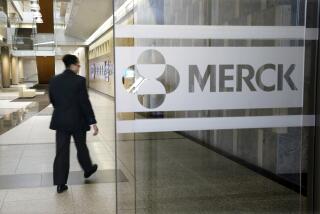Merck Warning Prompts Sell-Off
- Share via
NEW YORK — Merck & Co. warned Friday that its quarterly and full-year profit will miss forecasts amid sluggish sales of its key arthritis drug, Vioxx, and the strong U.S. dollar, sparking a sell-off of its stock.
The news fueled investor concerns that the company’s five major drugs will not muster enough strength to drive up Merck’s prescription-drug sales in the face of generic competition for some of Merck’s other drugs.
Its stock fell 8.96%, or $6.67, to close at $67.80 on the New York Stock Exchange, where it was one of the biggest percentage losers. The stock last dipped below $70 on March 23, when it closed at $68.98.
The Whitehouse Station, N.J.-based company estimated 2001 earnings of $3.12 to $3.18 a share, down from a previous forecast of $3.15 to $3.25. Analysts’ estimates ranged from $3.10 to $3.25 a share, with a consensus of $3.20, according to data compiled by research firm First Call/Thomson Financial.
A component of the Dow Jones industrial average, Merck projected second-quarter earnings of 77 cents to 79 cents, compared with the First Call consensus estimate of 81 cents.
Weak foreign currencies, which lower the value of goods sold outside the U.S., were still hurting its overall business as the dollar remains strong, Merck said. The company also said Vioxx sales are expected to fall short of the top of the estimated range of $3 billion to $3.5 billion for the year.
Concerns about Vioxx sales were first raised in April when Merck’s first-quarter results revealed what many on Wall Street viewed as disappointing sales of the arthritis and pain treatment.
At the time, Merck tried to quell fears Vioxx sales would miss year-end goals, saying quarterly U.S. sales of the drug were hurt because wholesalers needed to buy less after stockpiling ahead of a November price increase.
The company on Friday provided 2001 sales guidance for its five main drugs--including Vioxx--which Merck hopes can drive revenue growth as the firm attempts to compensate for a recent flurry of patent expirations on other key drugs, such as Mevacor for cholesterol and Pepcid for heartburn and ulcers.
The company projected Vioxx sales of between $3 billion and $3.5 billion; cholesterol drug Zocor between $5.8 billion and $6.2 billion; Fosamax for osteoporosis in a range of $1.5 billion and $1.7 billion; hypertension treatments Cozaar/Hyzaar between $1.8 billion and $2 billion; and asthma drug Singulair at between $1 billion and $1.2 billion.
Merck attributed the Vioxx shortfall to slower growth in sales of so-called Cox-2 inhibitor drugs, a class of drugs that Vioxx helped pioneer. Those drugs are not penetrating the market for analgesics and arthritis as quickly as expected, Merck said.
That class of drugs includes Pharmacia Corp.’s blockbuster Celebrex. Pharmacia shares slumped $2.71, or 5.26%, to close at $48.79 on the NYSE.
Vioxx generated global sales of $485 million in the first quarter--well below some forecasts of as much as $650 million--as global Celebrex sales jumped 24% to $649 million. But Pharmacia said its U.S. sales fell, also citing wholesalers stocking up before a price increase.
Merck said marketing and administrative expense would grow in the low single-digit percentage range for the year, scaled back from a previous projection of low double-digit percentage growth.
Research and development costs are expected to be $2.6 billion for 2001, below the previous estimate of $2.8 billion.
Sales from its Merck-Medco unit, which manages prescriptions for pharmacies and insurers, would reach between $25 billion and $26 billion in 2001, the company said. That compares with sales of $20.1 billion for the unit in 2000.
The company estimated that its gross margin would be about 39% for the year, about 1.4 percentage points lower than the company’s previous forecast.
More to Read
Inside the business of entertainment
The Wide Shot brings you news, analysis and insights on everything from streaming wars to production — and what it all means for the future.
You may occasionally receive promotional content from the Los Angeles Times.










